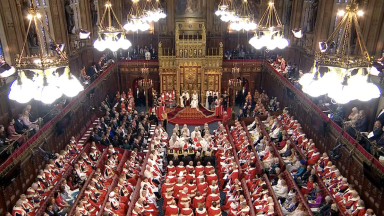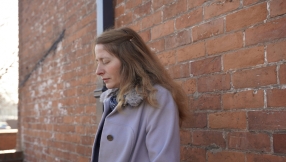
On Tuesday, King Charles III gave his first King's Speech as an anointed monarch at the State Opening of Parliament having given the Queen's Speech on his mother's behalf last year. Which means that this is the first King's Speech since George VI in 1951.
This is a crucial moment in the political calendar for the government to state its top priorities and kickstart a new programme of legislation. Ceremonially however, it is a moment of constitutional theatre that for most onlookers is frankly bizarre!
The King arrives in Parliament with much pomp and proceeds to the throne in the House of Lords. Then, in one of the most striking moments, the royal official named Black Rod is sent to summon MPs from the Commons. She then has the doors slammed in her face before knocking three times and leading MPs out to hear the king in the House of Lords. This is a ritual harking back to the English Civil War, and is an enduring symbol of parliament's independence from the monarch.
The strangeness continues. The King then reads a speech that is completely written by the government, setting out all of its plans for the next year of legislation. He delivers the speech as neutrally as possible to avoid hinting at any support or disagreement.
So begins the process of the parliamentary year – the Prime Minister and his government set out to 'sell' the content of the speech, and the opposition and backbench MPs seek to scrutinise and challenge it. New legislation will be set in motion which over the coming twelve months are meant to be debated in full in both houses of parliament with – given the government's still sizeable majority – those bills likely to become law during this period.
The King's Speech, or as it is officially known, the Speech From the Throne, traditionally ends with the following: 'My Lords and members of the House of Commons, I pray that the blessing of Almighty God may rest upon your counsels.'
Ceremony and bizarre ritual aside, this is an important moment in the parliamentary calendar to stridently pray for our nation, our government, our parliament, our democracy, our monarch, our leaders.
The reminder I frequently issue on my podcast to pray for our government and our leaders may be getting predictable by now, but 1 Timothy 2, verses 1 and 2 do still apply! We are encouraged, even commanded to pray for our rulers, whether we agree with them or not, whether we like them or not!
Many will see the pomp and ceremony, or hear a snippet of the PM's defence, or of the attacks from opposition MPs, and react in any number of ways. The temptation might be to moan at the pointless rituals and change the channel. It might be to throw our hands up in despair at the petty backbiting of debates and switch off altogether. But is our first reaction ever to pray for them?
No matter how much we might disagree with this government, or how strongly some might oppose the monarchy, Ephesians 6 verse 12 tells us this: 'our struggle is not against flesh and blood, but against the rulers, against the authorities, against the powers of this dark world and against the spiritual forces of evil in the heavenly realms.'
We owe it to those in positions of political, earthly authority to contend for them in prayer. Those of us in political parties may well be battling them at the ballot box, but ultimately it's not human authorities we're contesting when we pray for wise government, and righteous legislation, and justice for the poor and oppressed.
We should struggle in prayer. When was the last time you prayed ambitiously for something huge? When was the last time you prayed for one specific MP? One specific bill? Why not bring a local newspaper or a list of your local councillors to your church's next prayer meeting and pray through it.
And if, kind of like Black Rod, you've ever felt like the door to engaging with politics has been slammed in your face, or like you and your community have been left out of the room where key political discussions are happening, perhaps now is the time to pray for those doors to be opened. Instead of feeling powerless or disillusioned, why not engage and be part of the change. Democracy only works when everyone is involved, and we especially need those who will bring Jesus' compassion and wisdom into roles at all levels of governance - local, national, and international.
When the King was preparing to enter the House of Lords, he would have sat in the Robing Room opposite a mural by William Dyce called 'The vision of Sir Galahad and his Company'. It shows Jesus Christ sat on the throne. As Jesus says in Matthew 28 verse 18: 'All authority in heaven and on earth has been given to me.' So in this moment of great pomp and political importance, let's go to Him on the ultimate throne.
Tim Farron has been the Member of Parliament for Westmorland and Lonsdale since 2005, and served as the Leader of the Liberal Democrat Party from 2015 to 2017.Tim is also the host of Premier's 'A Mucky Business' podcast. His new book A Mucky Business: Why Christians should get involved in politics is published in November.













